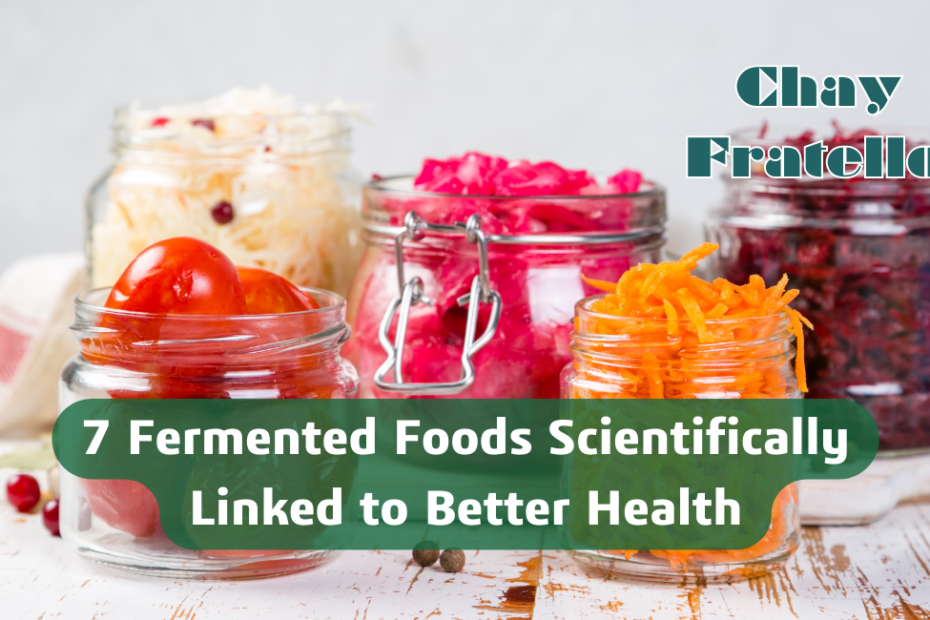Fermented foods, which are left to ferment for days, weeks, or even months to allow beneficial microbes to break them down, have numerous health benefits.
Fermented foods are gaining popularity, and rightfully so. With claims linking these foods to improved gut health, mental health, and a variety of other aspects of our overall health, it’s no surprise that people are happy to pile sauerkraut on their sandwiches or add kefir to their morning smoothies.
Fermented foods undergo a process in which bacteria or yeast are added to break down natural sugars. After fermenting the food or drink, we are left with a probiotic-containing product that may benefit our health in various ways.
A 10-day fermented-food diet resulted in a more diverse gut microbiome, indicating that the gut has a better balance of “healthy bacteria.” As a result, the same people had an improved immune response. Other research suggests fermented foods may have anti-inflammatory, blood pressure-lowering, and other health benefits.
If you’re wondering which fermented foods should be included in your diet to reap the benefits of these functional foods, here are seven fermented foods that have been scientifically linked to improved health.
1. Yogurt
Yogurt combines dairy milk with live and active cultures, resulting in the creamy food we enjoy with granola or fresh berries. Many yogurt options contain live bacteria, but dairy yogurt contains essential bone-health-promoting nutrients such as calcium and magnesium. Indeed, higher yogurt consumption is linked to higher bone mineral density and physical function in older adults.
Yogurt contains probiotic strains that improve intestinal health and anti-inflammatory and immune responses. Furthermore, some research suggests that consuming probiotics may be associated with reduced gas in people with IBS.
2. Kefir
Kefir is a slightly tart fermented dairy beverage that is easy to drink. Consumption of fermented dairy drinks, such as kefir, may aid in the reduction of inflammatory markers, abdominal pain, and constipation.
Kefir is a natural source of vitamin K2, a nutrient linked to a lower risk of fractures.
3. Kimchi
Kimchi is a traditional Korean dish made from salted and fermented vegetables such as cabbage. According to the data, moderate kimchi consumption is associated with weight loss in middle-aged and older people of Korean descent. In addition, other research has linked kimchi consumption to a lower risk of developing eczema and anticancer potential against pancreatic cancer cells.
4. Kombucha
Kombucha is at the top of many lists of trendy drinks. As a fermented tea, this drink contains antioxidants and live probiotics if not pasteurized before consumption.
Some evidence suggests that drinking kombucha may help fight inflammation, aid in liver detoxification, and promote healthy and balanced gut microbiota, but more well-conducted human studies are needed.
5. Miso
Miso is a fermented soybean paste that is an essential component of our favorite miso soup. It provides a salty umami flavor and a boost of live probiotics to the gut.
People who eat miso soup daily have a lower risk of developing stomach illnesses such as gastritis and gastric and duodenal ulcers than those who eat it infrequently or never. In addition, miso contains essential compounds that promote heart health, such as plant sterols, linoleic acid, and vitamin E, and it may help people maintain a healthy heart.
6. Sauerkraut
Sauerkraut is a fermented condiment made of fermented cabbage that is a popular topping for hot dogs and a must for a classic Ruben sandwich. In addition, regular consumption of sauerkraut can help to maintain healthy digestive flora. So, feel free to add some to your sandwich or toss some on top of your eggs, knowing you’re giving your gut some good bacteria.
7. Tempeh
Tempeh, made from cooked, fermented soybeans, is famous as a plant-based protein source. In addition to the gut health benefits of fermented foods, tempeh consumption may be linked to a lower risk of type 2 diabetes. Tempeh is versatile and can be used in stir-fries, sandwiches, and salads.
Learn more: What is the healthiest fast food?
